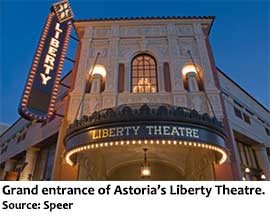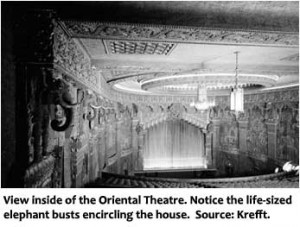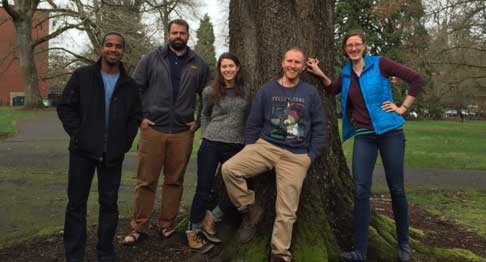One nice pleasure from researching Oregon theaters has been reading the popular success stories. As we continue to move forward with understanding the results of our theaters’ needs assessment, we wish to highlight some of our findings. Here, we take a look at two theaters that have sustained operations and one theater forever lost.
Liberty Theatre, Astoria
 The Liberty Theatre located in Astoria, OR is a place that is very dear to the people that live there. The theater offers a self-guided tour through its complex, and is considered a treasure my many. Built in 1925, the building housed a stage, Movie Theater, radio station, dance studio, and roughly two-dozen businesses. The Liberty quickly became a hub of entertainment for the area. It contributed to the community economically, culturally, and socially. Currently the Liberty stage is home to a number of events. These include the Astoria Performance Arts classical and operatic presentations, town hall meetings, and different national forums. The community has spent a lot of time in the past 10 years renovating and restoring the theater. It’s something they are proud of, as the theater is part of the town’s history and identity.
The Liberty Theatre located in Astoria, OR is a place that is very dear to the people that live there. The theater offers a self-guided tour through its complex, and is considered a treasure my many. Built in 1925, the building housed a stage, Movie Theater, radio station, dance studio, and roughly two-dozen businesses. The Liberty quickly became a hub of entertainment for the area. It contributed to the community economically, culturally, and socially. Currently the Liberty stage is home to a number of events. These include the Astoria Performance Arts classical and operatic presentations, town hall meetings, and different national forums. The community has spent a lot of time in the past 10 years renovating and restoring the theater. It’s something they are proud of, as the theater is part of the town’s history and identity.
Majestic Theater, Corvallis
The Majestic Theater is a well known theater in the southern Willamette Valley region. Located in Corvallis, OR and opening in 1913, the theater has served the area as a movie theater for over a century. The interior of the theater is something to be marveled. Inclusive with 800 chairs in leather upholstery, mirrors, tiled entrances, three double doors in front, and an exit on each side the theater is fully loaded with everything a historic theater needs to be a success The towns Gazette-Times wrote an entire article on the grand opening of the theater and gave the theater a great review and promising endorsement. By offering live theater and live music, the theater keeps busy by offering over 200 events per year. Being one of the oldest theaters in the state, the movie theater has remained loyal its customers and continues to serve the community of Corvallis and the surrounding area.
Oriental Theater, Portland
 The Oriental Theater, which existed in Portland, OR from 1927 through 1970, is an example of a lost cinema treasure. Due to lack of operational revenue, the theater was closed, demolished, and remains to this day as a parking lot. The theater’s life is captured in a vintage documentary available on YouTube. The short and somewhat obscure video (1,272 views at press time) tells the story of the fantastic theater. “Before the Dark: Portland’s Oriental Theater” takes us back among the revelry of New Year’s Eve 1928, when the theater opened its doors for the first time. As the name suggests, the theater displays elements from the Far East including life-sized elephant busts protruding from the walls. These and other sculpted plaster decorations maintained an exotic excitement. The loss of this gem is a reminder to the care required to preserve these architectural icons.
The Oriental Theater, which existed in Portland, OR from 1927 through 1970, is an example of a lost cinema treasure. Due to lack of operational revenue, the theater was closed, demolished, and remains to this day as a parking lot. The theater’s life is captured in a vintage documentary available on YouTube. The short and somewhat obscure video (1,272 views at press time) tells the story of the fantastic theater. “Before the Dark: Portland’s Oriental Theater” takes us back among the revelry of New Year’s Eve 1928, when the theater opened its doors for the first time. As the name suggests, the theater displays elements from the Far East including life-sized elephant busts protruding from the walls. These and other sculpted plaster decorations maintained an exotic excitement. The loss of this gem is a reminder to the care required to preserve these architectural icons.
Link to video about the Oriental Theater: https://www.youtube.com/watch?v=-oZ88y4i9BY
As we prepare recommendations and solutions to the difficulties facing historic theaters, it is important to examine both gains and losses. The Liberty and Majestic demonstrate the possibilities and diversifying theaters’ business model. In the case of the Oriental, the demolition demonstrates a break in the downtown fabric and the loss of an icon. Moving forward, our team hopes to identify paths to saving these threatened structures.
 About the Authors: John Jackson is a Midwesterner turned West Coaster and a first year Community and Regional Planning Masters student at the University of Oregon. Growing up both in Chicago, Illinois and Lincoln, Nebraska, Jackson is an avid geographer who has taken his talents to the Pacific Northwest to study the craft of urban planning and the unique ways of land use, built environment, and transportation that U of O has to offer. In his spare time, he enjoys drumming, playing basketball, and working out at the campus recreation center. He is an active member of U of O LiveMove.
About the Authors: John Jackson is a Midwesterner turned West Coaster and a first year Community and Regional Planning Masters student at the University of Oregon. Growing up both in Chicago, Illinois and Lincoln, Nebraska, Jackson is an avid geographer who has taken his talents to the Pacific Northwest to study the craft of urban planning and the unique ways of land use, built environment, and transportation that U of O has to offer. In his spare time, he enjoys drumming, playing basketball, and working out at the campus recreation center. He is an active member of U of O LiveMove.
 Rodney Bohner is a concurrent Master’s student in Community and Regional Planning as well as Historic Preservation at the University of Oregon. Originally from Pennsylvania, Rodney has worked on cultural resource projects in the Keystone state as well as Colorado, West Virginia, and Massachusetts.
Rodney Bohner is a concurrent Master’s student in Community and Regional Planning as well as Historic Preservation at the University of Oregon. Originally from Pennsylvania, Rodney has worked on cultural resource projects in the Keystone state as well as Colorado, West Virginia, and Massachusetts.
Photo Credits
Google, Inc. (2014). Retrieved from Google Maps: www.google.com/maps
Krefft, B. Oriental Theatre. Retrieved from Cinema Treasures: www.cinematreasures.org/theaters/2728
Speer, D. (2013). Liberating the Liberty: Honoring the Liberty Theatre of Astoria, Oregon and Other Historic NW Theatres. Critical Dance. Retrieved from Critical Dance: www.criticaldance.org
Works Cited
Greiff, C. (Ed.). (1972). Lost America: From the Mississippi to the Pacific. Providence: Pyne Press

